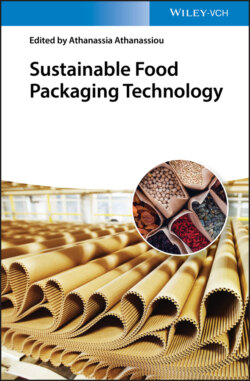Читать книгу Sustainable Food Packaging Technology - Группа авторов - Страница 30
1.3.11.4 Corn Zein
ОглавлениеZein is a group of alcohol‐soluble prolamin proteins found in the endosperm of corn. It is constituted by hydrophobic and neutral amino acids as well as some sulfur‐containing amino acid [139]. Corn zein has a Mw ranging from 18 to 45 kDa and it is soluble in ethanol solutions in water at 60–70 wt% [140, 141]. Indeed, corn zein is produced commercially by extraction with aqueous alcohol and dried to a granular powder. The high proportion of nonpolar amino acid residues confers highly hydrophobic properties and solubility characteristics to zein, allowing its use in food packaging materials [142]. Zein films are formed by dissolving the protein into aqueous ethanol or isopropanol, heating to 65–85 °C, cooling down to 40–50 °C, and casting them by solvent evaporation. The resultant films are, however, translucid and present an intense yellow color (see Figure 1.9). Glycerol is often used to reduce the film brittleness though it tends to easily migrate through the film matrix because of the weak interaction between protein and plasticizer molecules. Migration of glycerol results in loss of flexibility in the film. Zein films have good oxygen barrier properties and are greaseproof, which have been attributed to the helical conformation of the protein, but their mechanical properties and water resistance are low, similar to those of other protein films [143]. In order to overcome these deficiencies, blended films of zein with other biodegradable biopolymers have been widely studied [144–146].
Figure 1.9 A zein film obtained from corn.
